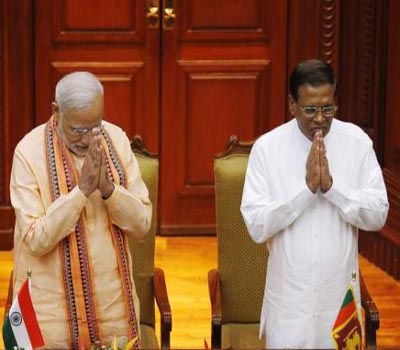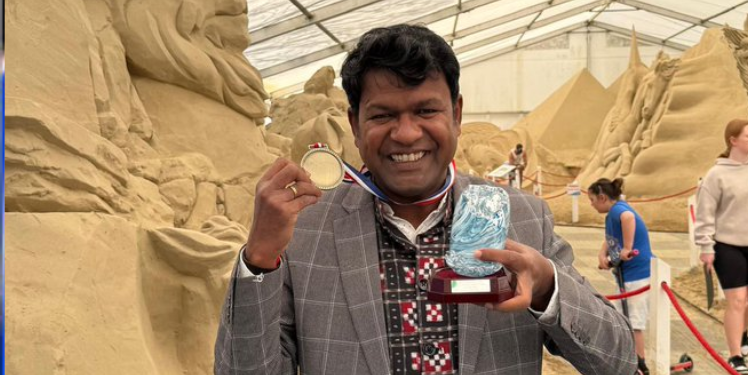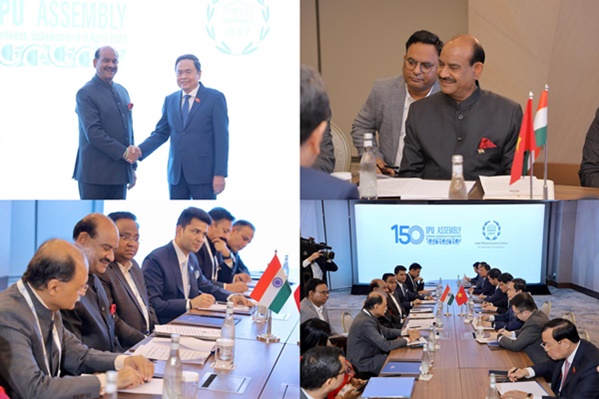High-optics, modest pacts mark Narendra Modi’s Sri Lanka visit
Fri 13 Mar 2015

COLOMBO, March 13, 2015 (Agencies) India stands for a “united Sri Lanka”, but wants an “early and full implementation of the 13th Amendment” that provides for devolution in the Tamil majority Northern and Eastern provinces, Prime Minister Narendra Modi said in Colombo on Friday.Mr. Modi, who was speaking at the historic Presidential secretariat after talks with Sri Lankan President Maithripala Sirisena also referred to “going beyond” the 13th amendment, that would “contribute to the process” of building a “future that accommodates the aspirations of all sections of society, including the Sri Lankan Tamil community”.The Prime Minister’s comments came a day ahead of his visit to Jaffna and Talaimannar, the first Indian Prime Minister to make that journey. The strong statement is likely to be welcomed in Jaffna on Saturday when he visits. In an interview to The Hindu ahead of the visit, the Chief Minister of the Northern Province C.V. Wigneswaran had called on India to remember its role as “guarantor” of Tamil rights, saying the 13th amendment “inadequate”, and wanting “something beyond it”.Mr. Modi began his heavily anticipated visit to Sri Lanka with a grand ceremonial ceremony, but a modest set of agreements being signed after his talks with President Maithripala Sirisena. Unlike his previous stops in the Seychelles and Mauritius, where Indian Ocean security cooperation and big ticket development commitments were made, in Colombo they announced four MoUs on visa exemptions for official passport holders, customs cooperation, youth exchanges and
education, and the construction of a university auditorium.Mr. Modi also announced e-visa on arrival services for Sri Lankans, a $318 million Line of Credit to upgrade Sri Lanka’s railways, and a promise to build Trincomalee as a “petroleum hub”, while also seeking movement on the 500 MW Sampur power project, that has been delayed for years due to environmental concerns.Referring to the contentious issue of fishing rights that has led to tensions between the two countries, Mr. Modi said it must be handled as a “humanitarian concern”. “It is also important that fishermen's associations of India and Sri Lanka meet at the earliest to find a mutually acceptable arrangement. It can then be taken forward by both governments,” Mr. Modi suggested.President Sirisena, who released 86 fishermen as a good will gesture a day ahead of Mr. Modi’s visit, did not refer to the issue, but said that Mr. Modi’s visit to the North would be a “historic moment” for India-Sri lanka ties. Meanwhile, Foreign Minister Mangala Samaraweera defended Prime Minister Ranil Wickramasinghe’s controversial comments on the “right to shoot” fishermen trespassing into Sri Lankan waters, the first reaction by the Sri Lankan government to the outrage in India’s parliament over the comments. “PM Wickramasinghe merely reflected the frustration felt by many of the fishermen locally, nothing more,” Mr. Samaraweera told The Hindu.Keywords: Narendra Modi, Narendra Modi's Indian Ocean visit, Narendra Modi's Sri Lanka visit, India-Sri Lanka bilateral ties, Ranil Wickramasinghe, Maithripala Sirisena, fishermen issue
education, and the construction of a university auditorium.Mr. Modi also announced e-visa on arrival services for Sri Lankans, a $318 million Line of Credit to upgrade Sri Lanka’s railways, and a promise to build Trincomalee as a “petroleum hub”, while also seeking movement on the 500 MW Sampur power project, that has been delayed for years due to environmental concerns.Referring to the contentious issue of fishing rights that has led to tensions between the two countries, Mr. Modi said it must be handled as a “humanitarian concern”. “It is also important that fishermen's associations of India and Sri Lanka meet at the earliest to find a mutually acceptable arrangement. It can then be taken forward by both governments,” Mr. Modi suggested.President Sirisena, who released 86 fishermen as a good will gesture a day ahead of Mr. Modi’s visit, did not refer to the issue, but said that Mr. Modi’s visit to the North would be a “historic moment” for India-Sri lanka ties. Meanwhile, Foreign Minister Mangala Samaraweera defended Prime Minister Ranil Wickramasinghe’s controversial comments on the “right to shoot” fishermen trespassing into Sri Lankan waters, the first reaction by the Sri Lankan government to the outrage in India’s parliament over the comments. “PM Wickramasinghe merely reflected the frustration felt by many of the fishermen locally, nothing more,” Mr. Samaraweera told The Hindu.Keywords: Narendra Modi, Narendra Modi's Indian Ocean visit, Narendra Modi's Sri Lanka visit, India-Sri Lanka bilateral ties, Ranil Wickramasinghe, Maithripala Sirisena, fishermen issue
No Comments For This Post, Be first to write a Comment.
Most viewed from Specials
Most viewed from World
AIMIM News
Latest Urdu News
Most Viewed
May 26, 2020
Do you think Canada-India relations will improve under New PM Mark Carney?
Latest Videos View All
Like Us
Home
About Us
Advertise With Us
All Polls
Epaper Archives
Privacy Policy
Contact Us
Download Etemaad App
© 2025 Etemaad Daily News, All Rights Reserved.






















.jpg)
.jpg)
.jpg)

















